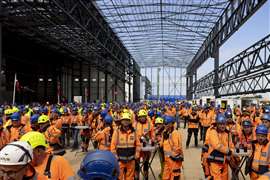Dubai ranks low on International Construction Costs list
18 January 2016
Dubai is a cheap place to build compared to other global cities, according to the latest International Construction Cost Index published by market research company Arcadis.
The index analyses the cost of construction across 44 major cities and found that the impact of strong currency performance and the fall in oil prices have benefited the global market.
Regionally, the Qatari capital is the most expensive city for construction in the Middle East, followed by Jeddah and Dubai.
Over the next ten years, Qatar looks set to spend $150 billion in Doha on roads, railways, stadiums and ports, as well as hospitality and social infrastructure, according to Arcadis. The country also has plans for further investment in transport, water and electricity infrastructure by 2020.
Dubai’s airport has surpassed London Heathrow as the busiest airport in the world, and the emirate is expected to strengthen by 2020.
The report provides an average price bracket for 13 different types of building in each location, including residential, commercial and public sector developments. The index is based on construction costs only and excludes land and finance. Costs are calculated based on estimates made by Arcadis cost management experts worldwide and take into account the likes of currency values, commodity prices, local labour markets and resource availability.
Of the 44 cities surveyed, New York, London and Hong Kong rank the most expensive for construction, while Bangkok, Bangalore and Taipei are the three least expensive cities. Dubai is ranked 18th.






